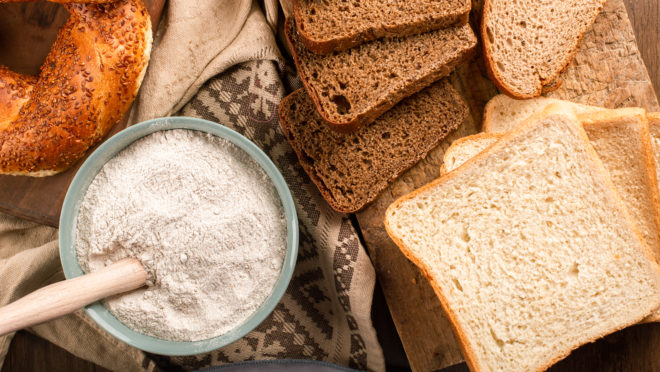Understand if the gluten is bad or not is essential for making correct dietary decisions.
There are also people with celiac disease or with some restriction on the substance who need to choose alternative foodsin order to reduce the symptoms presented.
See this and much more throughout this content.
Good reading!
After all, what is gluten?
Gluten is a protein complex found in some cereals, such as wheat, barley, rye and their derivatives.
In short, when wheat flour is mixed with water, the gluten forms an elastic network that provides elasticity and consistency to bakery productssuch as bread, pasta and cakes.
Although gluten is a fundamental part of the structure of these foods, some people may experience intolerance to this protein. So-called celiac disease is an autoimmune disorder in which ingestion of gluten triggers a harmful immune response in the small intestine.
Additionally, some people may have gluten sensitivity, which is different from celiac patients. They also experience gastrointestinal symptoms or other similar discomforts.
It is important to note that Most people can consume gluten without any problems and that gluten-free diets should only be adopted by those with a medical diagnosis of conditions related to the substance.
See also | Everything you need to know about gluten-free eating and have no one to ask
Is gluten bad?
A gluten protein It is a fundamental part of many people’s diets. However, it is important to note that for some individuals, such as celiac patients, for example, avoiding this substance is crucial.
Despite these restrictions, gluten also contains several benefits. Among them we have:
- Source of Protein: Gluten is a complete protein, providing all the essential amino acids needed by the body.
- Texture in Bakery Products: gluten gives elasticity and structure to dough, contributing to the desired texture in breads and baked goods.
- Increased Elasticity: Gluten’s ability to form an elastic network is essential for trapping gas in the dough, resulting in soft, voluminous bread.
- Improvement in Dough Quality: Gluten helps retain moisture in the dough, preventing baked goods from becoming dry.
- Culinary Versatility: its elasticity allows the creation of a variety of foods, from pasta to confectionery.
- Flavor and Aroma: Gluten contributes to the characteristic flavor of many baked goods, making them more palatable.
- Power supply: Gluten-based products, such as bread and pasta, are an efficient source of energy due to the complex carbohydrates present.
- Nutritional Enrichment: Some gluten-rich foods, such as whole wheat, provide the body with fiber, B vitamins, and essential minerals.
- Ease of Storage: Gluten-based products often have a longer shelf life and are easier to store compared to fresh, perishable products.
- Ubiquitous Availability: Gluten-containing foods are widely available, making them an affordable option for most people.
It is crucial to keep in mind that if gluten intolerance or sensitivity is suspected, it is essential to seek medical guidance for diagnosis and personalized advice.
See also | Gluten Free: guide brings together the main questions about the gluten-free diet
10 harms of gluten
For people who have gluten intolerancewhether due to sensitivity or celiac disease, ingesting this protein can result in various harms.
Below, we present 10 negative aspects of ingesting this substance.
Follow along!
People with celiac disease experience a autoimmune response to glutendamaging the mucosa of the small intestine and impairing the absorption of nutrients.
- Non-Celiac Gluten Sensitivity
Some people may be sensitive to gluten, experiencing gastrointestinal symptoms and other discomforts. without presenting intestinal damage characteristics of celiac disease.
Gluten consumption by sensitive individuals can lead to inflammation in the gastrointestinal tract, resulting in discomfort and digestive problems.
- Gastrointestinal Problems
Diarrhea, constipation, bloating and abdominal pain are common symptoms in people with gluten sensitivity.
- Impairment of Nutrient Absorption
In both celiac disease and gluten sensitivity, inadequate absorption of nutrients can lead to nutritional deficiencies.
- Dermatological Problems
Some gluten-sensitive people may experience skin problemssuch as dermatitis herpetiformis, characterized by painful rashes.
Gluten sensitivity can cause persistent fatigue and weaknessaffecting quality of life.
- Neurological Disorders
In more severe cases of celiac disease, neurological impairmentmanifesting as problems with balance, coordination and sensitivity.
- Relationship to Other Autoimmune Conditions
People with celiac disease are more likely to develop other autoimmune conditions due to dysregulated immune response.
- Diet Restrictions
The need to avoid foods containing gluten can make the challenging dietleading to a potential reduction in the variety of foods consumed.
To achieve this, it is essential to rely on natural product companies that are safe and attentive to their production process. An example of this is the Taina Alimentos.
The Curitiba brand is free from cross contaminationwhich results in healthy products that are easy to consume for celiac patients and other people looking for a healthy diet.
Don’t forget to find out more about the Taina. Visit the website or follow on social media.
What foods contain gluten?
We also put together a list of main foods that contain gluten and some tips on how to replace them with healthier foods.
Foods with Gluten
- Wheat
- Barley
- Rye
- Contaminated oats (if not certified gluten-free)
- Wheat flour
- Barley flour
- Rye flour
- Traditional pasta
- Conventional bread
- Common cakes and cookies
- Beer (most)
- Conventional breakfast cereals
- Traditional pizza
- I argue
- Bulgur
- couscous
- Traditional soy-based sauces
- Processed sauces
- Breaded products
Gluten-Free Alternatives
Check out some options now alternative foods to the substance.
Alternative Flours
- Rice flour
- Almond flour
- coconut flour
- Chickpea flour
Gluten-Free Cereals and Grains
- Quinoa
- Rice (brown, basmati, wild)
- Corn
- Amaranth
- Teff
Gluten-Free Breads and Pasta
- Gluten-free breads and pastas (based on alternative flours)
- Rice dough
Gluten-Free Drinks
- Gluten-free beer
- Cider
- Wine
Alternatives to Oats
- Certified gluten-free oats
Snacks and Snacks
- Corn or rice-based snacks
- Popcorn
Processed Products
- Opt for products labeled “gluten-free”
- Prepare sauces at home using gluten-free ingredients
Remembering that it is essential to check product labels to ensure that they do not contain gluten, especially in processed foods.
Is gluten bad or not?
The answer to this question depends on each individual.
For most people, gluten consumption It is safe and does not cause harm to health. However, individuals with celiac disease, wheat-related sensitivity or allergies should avoid gluten.
It is important to highlight that a gluten free diet it is not necessary for most people, and unwarranted exclusion of this component can result in nutritional deficiencies.
If you suspect gluten intolerance or sensitivity, it is recommended to seek professional orientationsuch as a doctor or nutritionist, for personalized assessment and advice.

Sign up for our newsletter and stay up to date with exclusive news
that can transform your routine!
Warning: Undefined array key "title" in /home/storelat/public_html/wp-content/plugins/link-whisper-premium/templates/frontend/related-posts.php on line 12
Warning: Undefined array key "title_tag" in /home/storelat/public_html/wp-content/plugins/link-whisper-premium/templates/frontend/related-posts.php on line 13




